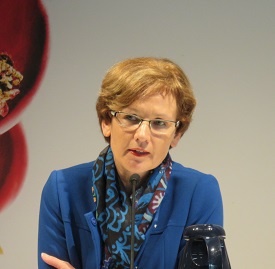Vegetarianism, fresh-cut in the spotlight at Fruit Logistica opener

Healthy lifestyle trends like vegetarianism, veganism and flexitarianism were at the core of the Fruit Logistica opening press conference in Berlin yesterday, where German industry leaders discussed a need for greater consumer access to produce items.
The calls were made in response to statistics that showed European fruit and vegetable consumption trends were still falling behind World Health Organization (WHO) recommendations.
In Germany itself, fresh fruit purchase volumes rose just 0.1% in 2015, while vegetable purchases dropped by 1.1%.
Dr. Margareta Büning-Fesel, who is a board member of the five-a-day produce awareness program '5 am Tag e.V.', said 50% of Germans were aware of the initiative and saw it as reputable, yet the sector still faced a great challenge in raising consumption.
She said this was despite trends toward vegetarianism and other diets that ought to help buck the trend.
"There is a lack of knowledge...if I gave them a turnip or a cauliflower, many people wouldn't know what to do with it," Büning-Fesel said.
She said a lack of opportunities to obtain fresh produce, especially attractive ones, and a lack of fresh-cut of convenience foods was also a contributing factor.
"Here the slogan should be, ‘make the healthy choice the easy choice’," she said.
"Instead of serving dusty conference cookies you should serve fresh fruit."
Stephan Weist, who is the category director fruits, vegetables and flowers at retailer Rewe, said there ought to be more demand for fruits and vegetables given the trend toward these types of diets.
"It should be that when we open our supermarkets we have difficulty finding enough produce before we close in the evening. Unfortunately that’s not the case," Weist said.
"60% of all Europeans want to eat more fruit…in comparison to other foodstuffs it has an excellent carbon footprint, even when it’s from countries that are far away.
"There is not a lack of goodwill or awareness. What is needed is action."
He said that action could come from businesses giving fruit to employees and customers, as a means to improving the health and productivity.
"Why? Because sick employees don’t work and sick consumers don’t buy anything," he said.
Weist agreed that more needed to be done in Germany's fresh-cut sector, highlighting there had been growth and his supermarket would "absolutely" be expanding in the area.
"There’s still a lot of reticence on behalf of the German consumer to embrace that [fresh cut]," he said.
"Five years ago the convenience sector in the Netherlands was as high as Germany, and they have one eighth of the population."
Weist is also the vice president of industry body Freshfel Europe, which in a release pointed to the fact the EU's fresh fruit and vegetable consumption fell by 11% from 2004 to 2013; the sharpest downturn came from Spain at 33% down to 138kg, compared to Germany with a 3% fall.
Freshfel said this was because fresh produce was competing more and more with a growing market of food supplements, which promise healthy nutrition and additional effects. Furthermore, the industry's trust had been shaken by various food alerts, leading to unjustified mistrust for the product as well as the alleged non-compliance with residue regulation.
But there are clearly opportunities. Weist highlighted the market could adapt to changing lifestyles and eating habits, making the most of other trends as well like snacking culture.
"Ten grams per capita per day would have enormous market stimulating effects for the producers, traders and retailers all over Europe," Weist said in the release.
"Moreover, these two million tons more would indeed end the discussion about unfair trading practices between retailers and producers."
More than 65,000 trade visitors are expected to attend Fruit Logistica this week, representing 135 countries.








































